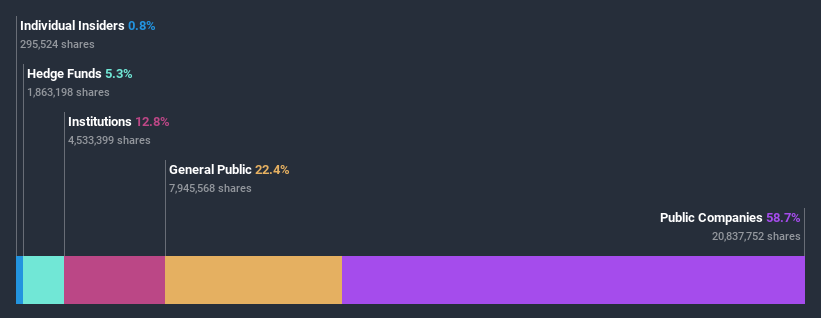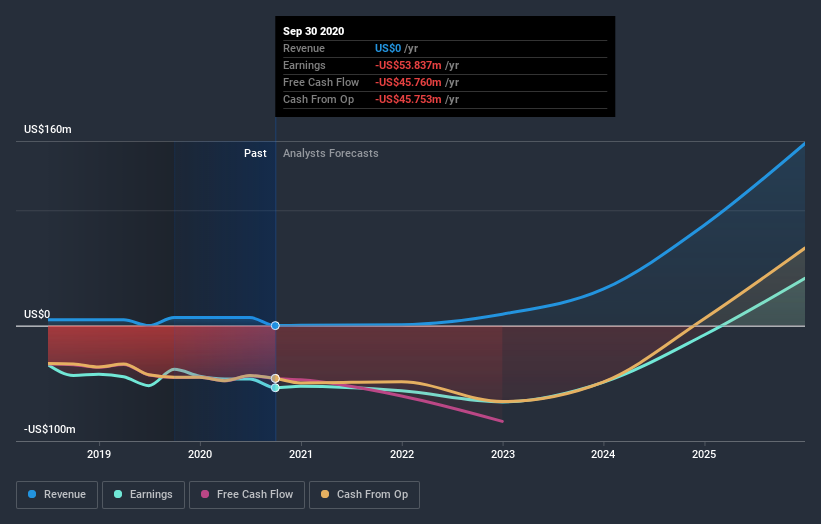Are Institutions Heavily Invested In Entasis Therapeutics Holdings Inc.'s (NASDAQ:ETTX) Shares?
If you want to know who really controls Entasis Therapeutics Holdings Inc. (NASDAQ:ETTX), then you'll have to look at the makeup of its share registry. Insiders often own a large chunk of younger, smaller, companies while huge companies tend to have institutions as shareholders. We also tend to see lower insider ownership in companies that were previously publicly owned.
Entasis Therapeutics Holdings is a smaller company with a market capitalization of US$100m, so it may still be flying under the radar of many institutional investors. Taking a look at our data on the ownership groups (below), it seems that institutional investors have bought into the company. We can zoom in on the different ownership groups, to learn more about Entasis Therapeutics Holdings.
See our latest analysis for Entasis Therapeutics Holdings
What Does The Institutional Ownership Tell Us About Entasis Therapeutics Holdings?
Institutions typically measure themselves against a benchmark when reporting to their own investors, so they often become more enthusiastic about a stock once it's included in a major index. We would expect most companies to have some institutions on the register, especially if they are growing.
We can see that Entasis Therapeutics Holdings does have institutional investors; and they hold a good portion of the company's stock. This implies the analysts working for those institutions have looked at the stock and they like it. But just like anyone else, they could be wrong. It is not uncommon to see a big share price drop if two large institutional investors try to sell out of a stock at the same time. So it is worth checking the past earnings trajectory of Entasis Therapeutics Holdings, (below). Of course, keep in mind that there are other factors to consider, too.
It looks like hedge funds own 5.3% of Entasis Therapeutics Holdings shares. That catches my attention because hedge funds sometimes try to influence management, or bring about changes that will create near term value for shareholders. Innoviva, Inc. is currently the company's largest shareholder with 53% of shares outstanding. This implies that they have majority interest control of the future of the company. Meanwhile, the second and third largest shareholders, hold 6.1% and 5.3%, of the shares outstanding, respectively.
Researching institutional ownership is a good way to gauge and filter a stock's expected performance. The same can be achieved by studying analyst sentiments. There are plenty of analysts covering the stock, so it might be worth seeing what they are forecasting, too.
Insider Ownership Of Entasis Therapeutics Holdings
While the precise definition of an insider can be subjective, almost everyone considers board members to be insiders. Company management run the business, but the CEO will answer to the board, even if he or she is a member of it.
Insider ownership is positive when it signals leadership are thinking like the true owners of the company. However, high insider ownership can also give immense power to a small group within the company. This can be negative in some circumstances.
Our most recent data indicates that insiders own less than 1% of Entasis Therapeutics Holdings Inc.. It seems the board members have no more than US$836k worth of shares in the US$100m company. Many investors in smaller companies prefer to see the board more heavily invested. You can click here to see if those insiders have been buying or selling.
General Public Ownership
The general public, with a 22% stake in the company, will not easily be ignored. This size of ownership, while considerable, may not be enough to change company policy if the decision is not in sync with other large shareholders.
Public Company Ownership
It appears to us that public companies own 59% of Entasis Therapeutics Holdings. It's hard to say for sure but this suggests they have entwined business interests. This might be a strategic stake, so it's worth watching this space for changes in ownership.
Next Steps:
I find it very interesting to look at who exactly owns a company. But to truly gain insight, we need to consider other information, too. Be aware that Entasis Therapeutics Holdings is showing 4 warning signs in our investment analysis , and 2 of those are concerning...
Ultimately the future is most important. You can access this free report on analyst forecasts for the company.
NB: Figures in this article are calculated using data from the last twelve months, which refer to the 12-month period ending on the last date of the month the financial statement is dated. This may not be consistent with full year annual report figures.
This article by Simply Wall St is general in nature. It does not constitute a recommendation to buy or sell any stock, and does not take account of your objectives, or your financial situation. We aim to bring you long-term focused analysis driven by fundamental data. Note that our analysis may not factor in the latest price-sensitive company announcements or qualitative material. Simply Wall St has no position in any stocks mentioned.
Have feedback on this article? Concerned about the content? Get in touch with us directly. Alternatively, email editorial-team (at) simplywallst.com.

 Yahoo Finance
Yahoo Finance 

